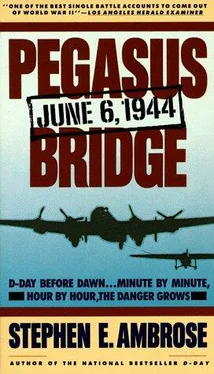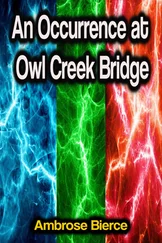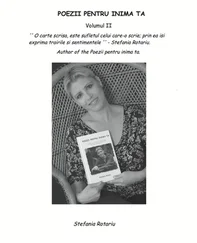Stephen Ambrose - Pegasus Bridge
Здесь есть возможность читать онлайн «Stephen Ambrose - Pegasus Bridge» весь текст электронной книги совершенно бесплатно (целиком полную версию без сокращений). В некоторых случаях можно слушать аудио, скачать через торрент в формате fb2 и присутствует краткое содержание. Жанр: История, на английском языке. Описание произведения, (предисловие) а так же отзывы посетителей доступны на портале библиотеки ЛибКат.
- Название:Pegasus Bridge
- Автор:
- Жанр:
- Год:неизвестен
- ISBN:нет данных
- Рейтинг книги:5 / 5. Голосов: 1
-
Избранное:Добавить в избранное
- Отзывы:
-
Ваша оценка:
- 100
- 1
- 2
- 3
- 4
- 5
Pegasus Bridge: краткое содержание, описание и аннотация
Предлагаем к чтению аннотацию, описание, краткое содержание или предисловие (зависит от того, что написал сам автор книги «Pegasus Bridge»). Если вы не нашли необходимую информацию о книге — напишите в комментариях, мы постараемся отыскать её.
Pegasus Bridge — читать онлайн бесплатно полную книгу (весь текст) целиком
Ниже представлен текст книги, разбитый по страницам. Система сохранения места последней прочитанной страницы, позволяет с удобством читать онлайн бесплатно книгу «Pegasus Bridge», без необходимости каждый раз заново искать на чём Вы остановились. Поставьте закладку, и сможете в любой момент перейти на страницу, на которой закончили чтение.
Интервал:
Закладка:
David Wood, who was laying on a stretcher, three bullets in his leg, recalls that the first sniper bullet struck the ground near him and he thought he was going to be hit next. 'Then a shot which was far too close for comfort thudded into the ground right next to my head, and I looked up to see that my medical orderly had drawn his pistol to protect his patient, and had accidentally discharged it and very nearly finished me off.'
Smith was having his wrist bandaged by another orderly. He tells of how the orderly stood up and was shot 'straight through the chest, knocked absolutely miles backwards. He went hurtling across the road and landed on his back, screaming, "take my grenades out, take my grenades out". He was frightened of being shot again, with grenades in his pouches.' Someone got the grenades out, and he survived, but Smith remembers the incident as 'a very low point in my life. I remember also, I thought the next bullet was going to come for me. I felt terrible.' Vaughan, bending over a patient, looked up in the direction of the sniper, shook his fist, and declared, 'This isn't cricket'.
Later that morning. Wood and Smith were evacuated to a divisional aid post in Ranville, where they were also shot at and had to be moved again.
Parr, Gardner, Gray, and Bailey were in the gun pit, trying to figure out how the anti-tank gun worked. Howard had trained them on German small-arms, mortars, machine guns, and grenades, but not on artillery. 'We started figuring it out', Parr recalls, 'and we got the breech out, all the ammo you want downstairs, brought one shell up, put it in, closed the breech. Now', they wondered, 'how do you fire it?'
The four soldiers were standing in the gun pit. Because of its roof, the snipers could not get at them. They talked it over, trying to locate the firing mechanism. Finally Gardner asked, 'What's this?', and pressed a push button. 'There was the biggest explosion, the shell screamed off in the general direction of Caen and, of course, the case shot out of the back and if anybody had stood there it would have caved their ribs in. That's how we learned to fire the gun.'
After that. Parr gleefully admits, 'I had the time of my life firing that gun'. He and his mates were certain that the sniping was coming from the roof of the chateau. Parr began putting shells through the top floor of the building, spacing them along. There was no discernible decrease in the volume of sniper fire, however, and the location of the snipers remained a mystery. In any case, the snipers were very good shots and highly professional soldiers.
Parr kept shooting, but Jack Bailey tired of the sport and went below, to brew up his first cup of tea of the day. Every time Parr fired, the chamber filled with dust, smoke, and loose sand came shaking down. Bailey called up, 'Now, Wally, no firing now, just give me three minutes'. Bailey took out his Tommy cooker, lit it, watched as the water came to a boil, shivered with pleasure as he thought how good that tea was going to taste, had his sugar ready to pop into it, when suddenly, 'Blam'. Wally had fired again. Dust, soot, and sand filled Bailey's mug of tea, and his Tommy cooker was out.
Bailey, certain Wally had timed it deliberately, came tearing up, looking - according to Parr - 'like a bloody lunatic'. Bailey threatened Parr with immediate dismemberment, but at heart Bailey is a gentle man, and by keeping the gun between himself and Bailey, Parr survived.
Howard dashed across the road, bending low, to find out what Parr was doing. When he realised that Parr was shooting at the chateau, he was horrified. Howard ordered Parr to cease fire immediately, then explained to him that the chateau was a maternity hospital. Parr says today, with a touch of chagrin, 'that was the first and only time I've ever shelled pregnant women and newborn babies'. After the war, reading a magazine article on German atrocities in occupied Europe, Parr came across a prime example: it seemed, according to the article, that before withdrawing from Benouville, the Germans had decided to give the village a lesson and methodically shelled the maternity hospital and ancient chateau!
Howard never did convince Parr that the Germans were not using the roof for sniping. As Howard returned to his CP, he called out, 'Now you keep that bloody so-and-so quiet. Parr, just keep it quiet. Only fire when necessary, and that doesn't mean at imaginary snipers.'
Soon Parr was shooting into the trees. Howard yelled, 'For Christ's sake. Parr, will you shut up! Keep that bloody gun quiet! I can't think over it.' Parr thought to himself, 'Nobody told me it was going to be a quiet war'. But he and his mates stopped firing and started cleaning up the shell casings scattered through the gun pit. It had suddenly occurred to them that if someone slipped on a case while he was carrying a shell, and if the shell fell point downwards into the brim-full ammunition room, they and their gun and the bridge itself would all go sky high.
By 0700, the British 3rd Division was landing at Sword Beach, and the big naval gunfire had lifted to start pounding both Caen and behind the beaches, en route passing over D Company's position. 'They sounded so big', Howard says, 'and being poor bloody infantry, we had never been under naval fire before and these damn great shells came sailing over, such a size that you automatically ducked, even in the pillbox, as one went over and my radio operator was standing next to me, very perturbed about this and finally Corporal Tappenden said, "Blimey, sir, they're firing jeeps".'
Someone brought in two prisoners, described by Howard as 'miserable little men, in civilian clothes, scantily dressed, very hungry'. They turned out to be Italians, slave labourers in the Todt Organization. Long, complicated sign -language communication finally revealed that they were the labourers designated to put the anti-glider poles in place. They had been doing their job, on Wallwork's LZ, and appeared quite harmless to Howard. He gave them some dry biscuits from his forty-eight-hour ration pack, then let them loose. The Italians, Howard relates, 'immediately went off towards the LZ where they proceeded in putting up the poles. You can just imagine the laughter that was caused all the way around to see these silly buggers putting up the poles.'
More questioning then revealed that the Italians were under the strictest orders to have those poles in the ground by twilight, June 6. They were sure the Germans would be back to check on their work, and if it were not done, 'they were for the bloody high jump, so they'd better get on with it, and surrounded by our laughter, they got on with it, putting in the poles'.
At about 0800, Spitfires flew over, very high, at 6,000 or 7,000 feet. Howard put out ground-to-air signals, using silk scarves and parachutes spread over the ground, that meant, 'We're in charge here and everything's all right'. Three Spitfires - wearing, like all the other Allied aircraft that participated in the invasion, three white bars on each wing -peeled off, dived to 1,000 feet, circled the bridges doing victory roll after victory roll.
As they pulled away, one of them dropped an object. Howard thought the pilot had jettisoned his reserve petrol tank, but he sent a reconnaissance patrol to find out what it was. The patrol came back, 'and to our great surprise and amusement, it was the early editions from Fleet St. There was a scramble for them amongst all the troops, especially for the Daily Mirror, which had a cartoon strip called "Jane", and they were all scuffling for Jane. There were one or two moans about there being no mention of the invasion or of D Company at all.'
Throughout the morning, all movement in D Company's area was done crouched over, at a full sprint. Then, shortly after 0900, Howard experienced
... the wonderful sight of three tall figures walking down the road. Now, between the bridges you v/ere generally out of line of the snipers, because of the trees along this side of the canal, and these three tall figures came marching down very smartly and they turned out to be General Gale, about six foot five inches, flanked by two six-foot brigadiers - Kindersley on one side, our own Air Landing Brigade commander, and Nigel Poett, commanding the 5th Para Brigade, on the other. And it really was a wonderful sight because they were turned out very, very smartly, wearing berets and in battle dress, and marching in step down the road. Richard Todd said that 'for sheer bravado and bravery it was one of the most memorable sights I've ever seen', and all the other men agreed.
Читать дальшеИнтервал:
Закладка:
Похожие книги на «Pegasus Bridge»
Представляем Вашему вниманию похожие книги на «Pegasus Bridge» списком для выбора. Мы отобрали схожую по названию и смыслу литературу в надежде предоставить читателям больше вариантов отыскать новые, интересные, ещё непрочитанные произведения.
Обсуждение, отзывы о книге «Pegasus Bridge» и просто собственные мнения читателей. Оставьте ваши комментарии, напишите, что Вы думаете о произведении, его смысле или главных героях. Укажите что конкретно понравилось, а что нет, и почему Вы так считаете.




![Stephen Ambrose - Citizen Soldiers [Condensed]](/books/346737/stephen-ambrose-citizen-soldiers-condensed-thumb.webp)




